




Multiserviceoperator forhealthcare, education,agriculture,solarenergy

moreradicalcalls forchange. Leadingthe chargeatthe General AssemblywasMia Mottley,primeministerofBarbados,who called fora“newinternationalism”.
Mottley ’s plansincluded theIMFissuing another $650bnofitsspecialdrawingrights (SDRs) re se rvec ur re ncytoh elpfinance clean-energyprojectsin developing economies.Shealsocalled forthe reallocationto developing economies ofat least$100bnof theSDRsissued by theIMFlast year,aswell asspecialchannelsofconcessionalfinance forprojectsstrengthening resiliencetoclimate change. TheIMFcouldcreateits own“special environmentaldrawingrights”facility.
Suchproposals arebecomingmainstream. InSeptember,Denmarkbecamethefirstcountrytooffer“lossanddamage” compensation tostateshardesthitbyclimatechange. AndUN Secretary GeneralAntónioGuterres hasbeen pushing countries toimposewindfalltaxes on oil andgas companiesmakingmega-profits heturmoiloftheenergycrisis.
The fourhorsemenofwhatmeteorologists calltheclimateendgame –conflict,chronic foodshortages,extreme weatherand vector bornedisease –are gallopingatan ever fasterpacetowardsus. IntheSahel,the IndianOceanseaboardandintheHornof Africa,theyhavealreadyarrived andare tearing aswathethroughcommunities
Thatiswhyyoungactivistsareonthe streets demanding seriousaction: anew greendealandthefundingto go with it Protestersarea lsojoiningupthe dots,callingforwiderchange inthe multilateral system.Thatstretchesfrom restructuringtheUNSecurityCouncil,to reformingtheUN’s specialisedagencies, as wellastheIMF andthe WorldBank
Thismakes thelack ofurgencyallthe morepuzzling intherun-upto COP27, thefirstUNclimatesummitinAfrica,in November.PreparatorytalksattheUN General Assemblyattractedonly aderisorynumber oftop decision-makers.Theprospectsofa ground-breaking dealinEgypt,asour editors andcorrespondents explaininthis edition, arefarfromstellar.
Itistheinterconnectednessofthethreats alongsi de climatechang e–d ee pening inequality,the foodandenergycrisisorthe risksofanotherpandemic–thatisdriving
torKristalin a es to help nousshocks nddamageare iggerquestionishow
ey,along ianand La tin ktodemands theinternational raUNtax rkoutmechanismand a emooted nferenceon year. hatiftheEgyptclimate on climate jectsandcomnthe calls louder.

32 INTERVIEW/PeterObi
The Labour Par ty candidate inNigeria’s February 2023 presidential elections talks to The Africa Report ab out economic reforms, the securit ycrisis and his plans to shake up political competition
40 WIDEANGLE/Reachingforthesummit
Having lost ground to China during the Trumpyears, the USisaiming to rebuild trus tand trade links withthe continent at the US -Africa Leader s Summit in December.

Our rankingof the larges t companie s in the African financial services sector.
THEAFRICAREPORT
57-BIS,RUED’AUTEUIL
75016 PARIS–FRANCE
TEL:(33)144301960
FAX:(33)144301930
www.theafricareport.com
CHAIRMANANDFOUNDER BÉCHIRBEN YAHMED
PUBLISHER DANIELLEBEN YAHMED publisher@theafricareport.com
EDITORINCHIEF PATRICKSMITH
MANAGINGEDITOR NICHOLASNORBROOK editorial@theafricareport.com
To findthefulleditorialteam, allourcorrespondentsand muchmoreonournewdigital platform,pleasevisit: www.theafricareport.com
SALES
DISTRIBUTION
Tel:+33(0)144301834 l.kiraly@jeuneafrique.com
With inve stor s star ting to pull back this ye ar, isit caus e for concern or a sign of maturity?
The government wants to diversif y the economy, but how much progress is being made?
The countr y is set to become a major natural gas producer in late 2023 thanks tothe Greater Tortue Ahmeyim of fshore project with Senegal.
CONTACTFORSUBSCRIPTION: WebscribeLtd Unit4College RoadBusinessPark CollegeRoadNorth AstonClintonHP225EZ
UnitedKingdom
Tel:+44(0)1442820580
Fax:+44(0)1442827912
Email:subs@webscribe.co.uk
ExpressMag 8275 AvenueMarcoPolo Montréal,QCH1E7K1,Canada
T:+15143553333
1yearsubscription(4issues): Alldestinations: €27-$32-£24
TOORDERONLINE: www.theafricareportstore.com
ADVERTISING DIFCOM
INTERNATIONALADVERTISING ANDCOMMUNICATION AGENCY
57-BIS,RUED’AUTEUIL
75016 PARIS-FRANCE
Tel:(33) 1 443019-60 –Fax:(33) 1 44301834 advertising@theafricareport.com
PRINTER:SIEP77-FRANCE N°DECOMMISSION
PARITAIRE:0725-I-86885
Dépôtlégalàparution/ ISSN1950-4810
THE AFRICAREPORT ispublishedby AFRICAMEDIAGROUP

Itotallyagree with LindiweZuluof South Africa[‘Food aidbeing usedtopressureneutral Africancountries over Ukraine, says ANC’s Zulu,’ TARonline,19July 2022].Europe,asusual,is tryingtouseAfrica forits ownbenefit.Itisexaggeratingthe levelofAfrica’s dependenceonUkrainian grainandmakingthe worldnotseetheimpact of Europe’s overdependenceonRussiangasand oil.It’sunfortunate for themthatthe average Africanis now more knowledgeable. Our remainingstumbling blocksare someofthe African leaders.[…] This warispresenting an excuse forthose whoare sleepingonthejoband failingtomakepolicies that canmakeAfrica abletofeed itselfand indeed theworld.[...]
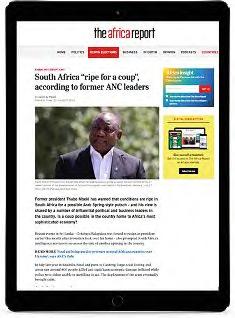
Allthatsaid,Africans with astrong memory andappreciationknow whotheirall-weather, truefriendsarebetween Russiaandthe West
SonnyMabhejuRegarding[the warin] Ukraine,Iunderstandthe positionoftheAfrican countries sittingonthe fencebecausetheyalso have alotofinterests withRussia.Manyof thepresentAfrican leadershave studied in the formerSovietUnion. Thearroganceofthe Westhasturnedthe
Forall your comments,sugge stionsand querie s, please writeto: TheEditor, TheAfricaRepor t, 57bis rue d’AuteuilParis 75 016- France or editorial@ theafricareport.com
Yes, civilunrestislikelyinSouthAfrica[‘South Africa “ripefor acoup”’,TAR online,22July 2022].SouthAfrica’s eliteistreatingitlikea Europeancountrywith apopulationhighin graduates, whenin reality fewhavequalifications.Anindustrial economicpolicycoupled with SMEswoulddrive an economy with somanyunskilled workers.Inaddition,the businessandpoliticalelitehave captured allthe institutionsandorganisationspeoplesaw as the alternativepoint forrefuge in timesofneed.A coupisnotlikelybecausethere hasneverbeen a conflict betweentheState andthearmy, butthe geopolitics andtheslave mentalityand colonial mentality by Westernnationsmaypushthe soldierstoanurge.SouthAfricans don’twantto bebullied andcolonialscarsare stillfresh,plus peopleliketolearnthehardway
SilumkoBushulaAfrican youthagainstit. Africansshouldchase away their leadersfrom powerbecausetheydon’t respecttheconstitution theyhavesignedwith their ownhands
Khalil
InNigeria,only avery insignificantpercentageofpeoplelistento Russiannews channels.
Buttheoldergeneration confessesthatRussia didnotcolonisean Africancountry,itnever instigatedacrisisto helpitself,anditgave scholarshipsand[aid] toAfricancountries in supportofindependence movements.
Russiaisadjudged tobe asincereanda reliablefriend.
TseyinaTorOn saleat your usualoutlet.Ifyou experience problemsobt aining your copy,pleasecontact your lo caldistributor,asshown below
GHANA: TM HUDU ENTERPRISE, T. M. Hudu,+23 3(0)20 9 007620,+23 3(0)2475 84 29 0, tmhuduenterprise@ gmail.com – KENYA, UGANDA ,TANZANIA: THENEW ZP OINT,D ennisLukho ola, +256 701793092, +254 724 825186,denluk07@ yaho o.com –
ETHIOPIA: SHAMA PLC, AishaMohammed,+25111554 5290,aisham@shamaethiopia.com –
NIGERIA: NE WS STANDAGENCIESLTD,Marketing manager,+23 4(0) 90 96 4610 00,new ss tand20 08@gmail com;STRIK AENTERTAINMENT NIGERIALIMITED, Mr sJoyceOlagesin,info.nig@ strika.com –
SOUTHERNAFRICA: SALES ANDSUBSCRIPTIONS:ALLIED PUBLISHING, Butch Cour tney;+27 08 327234 41,b erncour tney @gmail.com –
UNITEDKINGDOM: QUICKMARSH LT D, Pas caleShale,+ 44 (0) 207928 5443, pasc ale.shale @quickmarsh.com
UNITED STATES &CANADA: Disticor,KarineHalle,514 -4 34 -4 831, karineh@dis tico r.com
ZAMBIA: BO OKWORLDLTD, ShivaniPatel,+26 0(0)211230 60 6, bo ok wo rld@realtime.zm Forother re gions go to www.theafricarepor t.com
ABD GROUP P57; AFIS2022 P14,17;AFRASIABANK P140;AIRBUSP7;BASFWESTAFRICA P79;BUAGROUP P72-73;CIB P5;CREATIVEASSOCIATES
INTERNATIONAL P53;CYBASTION P47;DASSAULT AVIATION P67;EBOMAF P25;ESATAL TDB P53;ETAH-NAN &COP117;ETEXNIGERIA P77;EURONEWS P119; GEHEALTHCARE P53; INF -REP.OFBENIN P27-30; INSTITUTEOFDEVELOPMENTSTUDIES P89;KMNLAW P115;KONNECTEUTELSATP 75;LIEBHERR P123; MATTEL P137;MCC -MILLENNIUMCHALLENGECORPORATION P49,55;MEDLANDHOSP.P49; MSC P69; MTNGROUP P19,21;NANABOUBAGROUP P113; NATIONALBANKOFMAURITANIA P135;OADC -OPENACCESSDATA CENTRES P81;OCPP 37;ORANGE P2;PERENCOP125;RADISSONHOTELGROUP P39; RAWBANK P87;REP. OFCOTED’IVOIRE P127-130;REP.OFDJIBOUTI P139;SANLAM P85;SPARKLEP103;TRINITYENERGY P53;UBAP 23;USAID P44-45,51
Whenarmedforcesarescrambled,theyputtheirliveson theline,sotheyneed ahelicoptertheycantrusttogetthe jobdone,whatevertheweather,whateverthesituation.



Versatile,multi-purpose,andequippedwith arenownedautomatic fightcontrolsystemandupgradedavionics,theH225Misthe long-rangehelicoptertheycan relyon.Therewillalwaysberisk anddanger,butwhereverthecallcomesfrom,theH225Mwill helptokeepourworldbeautifulandsafe.




TheAfricaReport’sexclusiveguidetothequarteraheadfeatures keyeventsfromtheworldsofpolitics,businessandculture.
FamineisexpectedtohitSomaliafrom October, Egypthoststhe
UNCOP27climatesummitin November andSouthAfrica’sANC holdsanelectiveconferencein December. Meanwhile,galleries fromacrosstheglobeandcontinentshowofftheirtalentsatanart fairinLagos(above)andKenya’sfuelpricescouldrise.

As asign of howhighfoodinsecurityis rising, nearlyeightmillion people–orhalfofSomalia’s population –are inneed ofhumanitarianassistancedue to yearsofbad rainsandthe impactofRussia’s waronUkraine.Adam Abdelmoula,theUNhumanitariancoordinatorfor Somalia,toldmedia: “The faminereviewcommitteeassessedthat faminewouldhit Somaliasometime betweenmid-October andDecember, unlesswemiraculouslymanageto upscaleourhumanitarian response. Thatis,byallaccounts,a verybig‘if ’, giventhecurrent levelofresources that we have athand.”
Climatechangeisamajor factor, bringingmoreunpredictability
Medium term (Oct.’22 –Jan.’23)
Presence countries
Minimal Stressed Crisis
Emergency Famine
Notmapped
Remote monitoringcountries
Minimal Stressed Crisisorhigher
Abdelmoulasaid: “Thecurrentunprecedenteddrought –a resultof fourconsecutivefailed rainyseasons –withthefifthand thesixth projectedtoalso bebelowaverage,iscausinghuge foodinsecurity.”
Conflictalso plays arole. As themapshows,Somalia isnottheonlyAfrican region experiencingafood securitycrisis. AreasoftheSahel, Ethiopia,Sudan, SouthSudanand Kenyawillalsohaveveryhigh levels ofneed forfoodassistance.Kenya istheonly country with foodinsecuritynotcurrentlyhosttoanarmed conflict.A reportfromthe WorldFood Programme
says:“Highstaple foodpricesare constraining householdpurchasingpowerand foodaccessinboth urbanandruralareas. Staplefoodpricesrangefrom 22%to63%above averageformaize, and12% to 44% above averagefor beans.” Estimatesare that 4.1 million people, mostlyin Kenya’snorth,areexperiencingacute foodinsecurity. WiththeCOP27climatesummitset for EgyptinNovember,the pressureisonpolicymakersto findsolutionstothecurrentandfutureproblems caused by climatechange across Africaandthe world.
NEDBANK’SOFENTSE THELEDI on therisks of SouthAfricabeing named on theFinancial Action Task Force’s grey list forweakanti-moneylaunderingand counter-terrorismfinancingmeasures
FUEL
Kenya’sPre sident William Ruto will havea tough decisiontomakeon 14 October, when thenew fuel priceregimecome sto anend.Prices have alre ady risenafter thegovernment optedtocut subsidie s, and ares et toris efur ther
On 1October,Emrie Brown take soveras chiefexecutive of SouthAfrica’sRand Merchant Bank(RMB). SheisanRMB veteran, havingrecently servedas head of banking and head of inve stment banking.

‘Global correspondent banksand other financial institutions […]are likely to demand ahigher level of duediligence’










Since hanginguphis runningsho es in 2015,Ethiopian long-dis tancehero HaileGebrs elas siehas been building up hishotel chain, whichisnowoneof thecountry’s larges t. De spitethe Covid pandemic’simpactontourism,and the ongoing conflictinTigray, HaileHotels &Res or ts opened it snewes tproper ty, theHaile Grand AddisAbaba,for EthiopianNew Ye ar in September, with bo okings star ting in October.

In 2021, aFrenchmuseum, aCambridge collegeand aScottishuniversit yall returned looted ar tefactstoAfrican countrie s. Butthere hasbeenastony silenceon thesubjectfrom London’s BritishMuseum, whichcounts Nigeria’sBenin Bronze sand Eg ypt’sRoset ta Stone among itsmostvisited treasures.The RosettaStone –which enabledlinguists to decipher Eg yptian hieroglyphicsfor thefirst time–isthecentrepieceofanexhibitionat the BritishMuseuminOctober.The stone wasfirst movedtoAlexandriain1799duringNapoleon Bonapar te’s ‘Egyptiancampaign’;itwas then takenfromEgyptby theBritishin1801as spoils of theirvictory againstthe French

3-7October
Ca pe To wn hosts Africa OilWeek, bringing to getherkey players in thes ectorto talk about theimpact of theUkraine crisis and theenerg y transition. af ri ca -o il we ek.com
7October
Thevoter sof Les ot ho have achance toturn apageonyears of politicalinfighting and instabilit yinnational elections.
10 -11October
TheInves ting in Africa conference in Lo nd o n, UK hopes to spur de al-makingin fintech, construction, agriculture and energy afs icne t
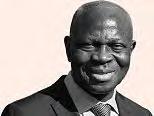
25-27October
TheC anada- Africa ChamberofBusiness holdsthe Africa
Accelerating Conference2022in Jo ha nne sb ur g to talk aboutoppor tunitie sin miningand other sector s. canada af ri ca .c a
GILBERTHOUNGBO
Theformer prime minister of Togo leadsthe UN InternationalLabour Organisationon 3October.Hewants to protectworkers’rightswhile helpingsuppor tkey sectors.
Don’tLookBack, AMemoirof War, Survival andMyJourneyfromSudanto America channels AchutDeng’smemorie s ofherlifeasa refugeeand beginninga new life in theUS. Sharing herstory and herthoughts,Achutexplainsher driveto keep moving forward.


More and more,clientsare looking forwaystokeep theirstaffproductiveina dynamicallychangingbusinessenvironment.Whether yourpeopleareworking fromhome, theofficeorabroad,thereisagrowing recognitionthatdigitising youroperations can offer unprecedentedcommercial valueinflexibility,productivityandgrowth.Thisnew, digitalrealitymeans thatitismoreimportantthan evertostayagile -if thereisanythingthatcanslow abusinessdown,itis beingburdened by old technology
Having madesubstantialinvestmentsinfibretechnology,high-speed terrestrialandunderseanetworks andnew frequencyspectrumacrossthemarkets whereinitoperates,MTNisperfectlypositioned to respond to thisshiftinthemarket
Afew yearsago,MTNalsomadethedecision to build anIP capable radionetwork fortheirmobileservices,giving theircorenetworktheability to seamlessly integratewithenterpriseIPnetworks. Theirmobile towers deliverservices to enterpriseclientsabsolutelyanywheretheyhavea network,shorteningthelast mileand removingcomplexityandcost
Nowthereisincreasingdemandfromclientstoconnecttheir remotesitesinallareas,includingruraland semi-rural.MTNhasassistedclientswith overcoming thisconnectivityhurdle,enablingtheir staff to getthe jobdonewherevertheyare
ForMTN,the focushasshiftedfromjustbeing acore telecommunicationsservicesprovider,towardsalso becoming atechnologysolutionsprovider.Their serviceofferingnowalsoincludesthe Internetof Things (IoT), Unifiedcommunication,Cloudsolutions,Securityas aServiceand Managednetwork.Thescope haschanged to beingclientandindustryspecific, so the requirementsandserviceportfolio varyfromone client to thenext.The expectationisthat acompany likeMTNmust respond to thesechallenges,helping clientstogetbusinessdonebetterastheyshiftfrom old to newtechnologies
Asmanybusinessescontinue to grapplewith adigitallydynamic world,theyfacenew challengesthat havetobesolved.Thisenvironmentwillbenefitthose thataremoredigitally enabledandagile. It is abrave newworldthatwill favouronline overon-site,wireless overwiredandfluid overformulaic. Businesses willseekout partnersandsuppliersthatareeverybit asflexibleand forward-lookingastheyare
Ultimately,clientsneedpartnerslikeMTN Business thatwillinvestininfrastructure, delivertheservices theyrequire,havemarketcredibility,are financially soundandhavea long-termcommitment to their marketpresence.
JACK UPPAL
TheAfricaand Middle East operations of US carmaker GMwill be runbyJack Uppal, aGMveteranofmorethan20 ye ar s. He will be seekingtotakeless ons fromhis most recent positioninChinato expand auto sale sonthecontinent.

Africa Risen: ANew EraofSpeculative Fiction feature s32s cience fiction,fantasyand other storie sfromAfrican writers, highlighting their creativity and world-building.

20 million
TheUnitedNations es timate sthatonthe eveof thet wo -yearanniver sary of thes tart of theconflict in TigrayinNovember 2020,that alarge segmentof thepopulationof115 million is in need of humanitarianassis tance, es timatedtocos t$ 3.1bn.
*Averagesbasedon10countries inSouthern Europe, 53inAfrica
The world’sdevelopingcountries have theirbestchancein recent timesofgetting abetter dealonclimatejusticewithEgypt’s hostingoftheUN COP27climateconferenceon 6-18November. Africanpolicy-makersarguethattheyneed tobeunitedandhave aclearagendawhen goingintothesetoughnegotiations.
Former WorldTrade Organisationdirector Pascal Lamy told mediahisthoughtsaboutthecontinent’sfocus.“Africa’s main problemisnot reducingitscarbonemissions.[…]Africa’s populationis goingto doubleby2050,whichisthetime we have adopted fornet zero carbon economies.Africa’s energyneedswillgrow, Africa’s energyconsumptionwillgrow,andthenthequestionis howcan Africabestmanagethistrajectory.”
But evenif poorercountries areabletogetbigcommitmentto financing agreen revolutionandclimateadaptionpolicies,the battlegroundwillshiftto gettingrichcountries to respecttheir promises–somethingthatcontinuestoprove difficult.




The ar t scenewill de scend on Ar tX Lagos from 4- 6 November to bask in the creativity of the continent’s intere sting and innovating ar tists, with talks,prizes and other events Theart fair created by Tokini Peterside-Schwebig, is in its seventh year, with a theme on ar t’s ability to convoke:

‘Who Will Gather Under the Baobab Tree?’
Power isthe backbone of industry and South African utility Eskom is in the midst of a crisis hitting businesses and households across the countr y. Years of mismanagement have hurt the state- owned enterprise, withblackoutsa regular occurrence due to an inability to manage planned maintenance on infrastructure.
Eskom is at the centre of debates about South Africa’s energ y transition.It is seekinga $476m loan from the World Bank to convert the 1,000MW Komati coal-fired facility into a renewable producer and battery station.
Eskomisdogged by unplanned breakdowns at its plants
Remainingenergy
Planned Unplanned Otherlosses
100% ofavailablecapacity
60%
20%
Jan
Interruptedby Covid lo ckdowns in 2020,Ghanaian British ar tist Lynet te YiadomBoak ye’s Fly in League withthe Night exhibition of painting sof creative por traits will return to the Tate Britain museum from 24 November

Lastyear ’s event showcased120artists
Thethree-dayartfair isinitsseventhyear
Galleries from across the globe and continent will show off their talents.AFIK ARIS in France will highlight paintingsby Nigerian ar tist Matthew Eguavoen dealing withthemes of love, mental health and intersectionalit y. Ghana’s Galler y 1957, Stevenson of South Africa and Côte d’Ivoire’s Galerie Cécile Fakhoury will also be there.






SOUTHAFRICA
SouthAfrica’s AfricanNational Congress (ANC)saw its voteshare fallbelow the50%markin2021 municipal elections. It is riven by factions, astherumpofthose loyal topreviouspresidentJacob Zuma – and keento inherita similar patronage machine – push back against President Cyril Ramaphosa,himselfhobbled by accusations overlarge amountsofcashdiscovered athis farm.
Whilea policy conferenceinJulytried to refocusthe partyon deliveringjobs, growthand a just energytransition, raw politics keepsdiverting attentionelsewhere. Andthe Decemberelective conferenceisimportant:itis
themomentwhentheANC decideswho getsthetopsix jobsinthe party, includingthe president Ramaphosa is up against long-term opponentLindiwe Sisulu, formerhealthminister Zweli Mkhize, and formerrival Nkosazana Dlamini Zuma.The deputy presidency will be fought outbetween Ronald Lamola,Mmamoloko Kubayi, David Mabuza, PaulMashatile and Oscar Mabuyane. Key tovictory willbethe supportgiven to variouscandidates by regionalbranches, which send delegates tothe conference accordingtothesize of the provincialparty.

2- 4 December Dar es Salaam will host Swahili Fashion Week, at tracting clothingand modelling talent from across East Africa
13-15 December Tr ying to seize on the momentum of the Covid crisis, theAfrica CD C will host the second International Conferenceon Public He alth in Africa – this time in Kigali
says the Muhammadu Buhari governmentwill fight bandit s and deliver on security by December, before le aving of fice
29 -30 December The Afro Nation concert series will return to Ghana, fe aturingmany popular Afrobeats acts
‘Our ultimate goal is to eliminate them all together and restore total peace in ever y inch of the Nigerian soil’
BROADBAND SERVICEDELIVERSCRITICALBROADBANDACCESST OCLOSE
Accesstoconnectivityplays acrucial roleineconomicandsocialdevelopment. KONNECTprovideshigh-speedInternetcoveragetothousandsofpeopleinruralandurbanareasthroughoutSub-SaharanAfrica,makingit acriticalsolutiontohelping bridgeAfrica’s digitaldivide. ModupeOkeowo,Konnect ’s CountryManagerforNigeriaandGhana,tellsusmore.
unservedpeopleacrosssub-Saharan Africaoverthenext 5years.Thiswill enablehouseholds,businesses, schools,hospitalsandgovernments toenjoy thesocial and economicopportunitiesthat Internetconnectivity brings.
costingunder99dollars,homesand workplacescangethigh-speedconnectivity
WHAT’SNEXT FORKONNECTINAFRICA?
EUTELSAT KONNECT is a new-generationHighThroughputSatellite launchedin2020byEutelsat,oneof themostinnovativeoperatorsinthe commercialsatellitebusinessforover 40years. Konnectisageostationary satellitethatdelivers fixedhighspeedconnectivityin40countries throughoutsub-Saharan Africaand offers75 Gbpscapacity across its65 spotbeamswhichgivesit adistinct advantage overothersatellitesover Africa.
It’s alsothe firsthigh-speed Ka-band satelliteoverAfricadeliveringupto 100Mbps speedincomparison to othersatellite operatorsthatprovide upto30Mbpsspeedmaximum in Nigeria. Konnect haswidercoverage and anambition toconnect amillion
WHAT SETS KONNECT APARTFROM TRADITIONALTELCO PROVIDERS?
Speed –Konnectdelivers high-speed connectivityupto100 Mbpsnomatterwhereyoulive, whereasterrestrial networkscan onlydeliversuchhigh speedconnectivityinurbanareas. Over99% reliability –asasatellite servicewedon’t relyontheterrestrial networksoavoidthefrequent fiber cutsterrestrialproviders experience inSub-SaharanAfrica.
Affordability –Konnectprovidesunlimited dataconnectivityforaslowas 10dollarspermonth.With unlimited data,families on astrictbudgetwill neverbeoutofInternetuntiltheend ofmonthlyvalidityperiod. That really givesusanedge!
Technology –youdon’tneedtoinstall abig, expensivedish. Konnect haschangedallthat.Witha 74cm dish, thesame as cable TVoperators,
Konnect’s objectiveistoconnect a millionnewusersby2025through ourstandardenterpriseandhousehold connectionsandthroughour WiFiproductcalled KonnectWiFi. Currentlyavailablein Côted’Ivoire andDRC andsooninNigeria,Tanzania,andothersub-Saharancountries. KonnectWiFiisa communityopenairWiFihotspotaccessibletopeople viatheirmobilephones.Thisis rapidlychangingthedynamics,connectingtheunconnectedinruralareasas wellastheunderservedinsuburban areas.So,we’rebeginningtosee a highusability forthisproduct
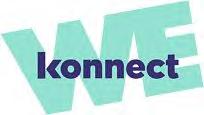

Apartfrom Konnect ’s amazing stridesinconnectingpeoplein urban,ruraland remoteareasof sub-SaharanAfrica, Konnectbrings solutionsforeducation,health, agricultureandenergy.Duringthe pandemic,weprovidede-Learning
ande-Healthsolutions.InNigeria, inpartnershipwith Coollink,we partneredwithgovernmentand privateenterprisetoconnecthundredsofprimaryandhighschool pupilstoonlinematerials. We did thesameinDRC,workingwith Schoolap.Weintendtocontinue leveragingoursatelliteconnectivity inthee-Learningspace.
We alsoconnectedhospitalsand isolationcentresinNigeria,workingwithgovernmentandourlocal partners, Coollink.
InGhana, we’re workingwith greenhouseandagribusiness companiesthatuseourservicefor Agritech requirements.
Then,ofcourse,there’sclean energywhich,withoutconnectivity, comeswithitsownchallenges.In Nigeria,solarfarmsuseourconnectivityservicefor remotemonitoring. Thesesuccessesshowthat Konnect satellitebroadbandisanenabler andthat,whereveryouchooseto liveorwork, Konnectwilldeliver highspeedInternetconnectivity. Youcanseewhatwe’redoingin yourcountryonwww.konnect.com andinNigeria,oncoollink.ng.

Africanartis ts will have theirtimeinthe sunatMiami’s Ar t Week. From 1- 4 December, AfriKinA rt will pres entits exhibitionwiththe theme‘TheBeaut yful Ones AreNot Yet Born.’ Theartis ts fe atured this ye ar have notbeenannounced, butlas tyearfeatured Nigeria’sD obaAfolabi, Jamaica’sPeter Wayne Lewisand others
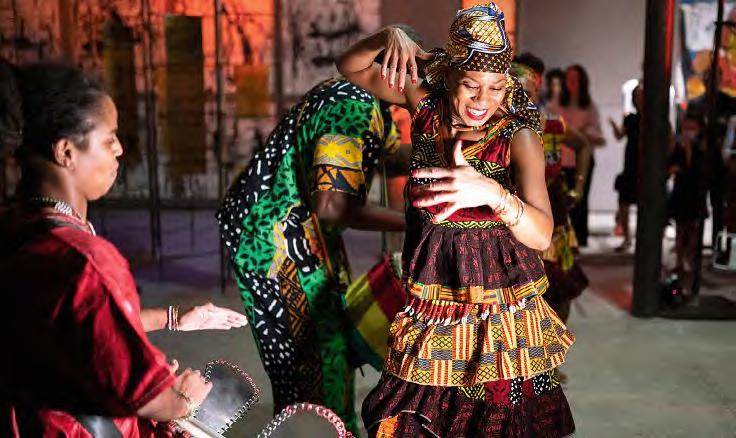
Ther ewill be ablo wa gainst go -slo ws in La go s, Nige ria’se conomic capital,in De cembe r. The government plans to do te st runs on theBlueLine tr ains ys temlinking Mile 2to Ma rina,which isthe fir st phas eoftha tr ailw ay.T hecontr acto rfor the project, whichisb eing finance dbythe La go s government ’s funds, is ChinaCivil Engine ering Cons tructio nC orporation.After manydelay s, co mm ercial op er ations ares et to be gininthe fir st quar te rofthene xt ye ar.T he se condpha se,to ex tend thelineto Okokomaiko will be ginafter the fir st phas eisoperational
Breakingfromthe Trumpian tradition of labellingcountriesinAfricaas “shitholes”, theUSadministration of PresidentJoe Bidenhas launched a fresh bid fordiplomaticinfluenceon thecontinent. It hassummonedthe headsofstate of Africatothe WhiteHousefor theUS-AfricaLeaders Summit on 13-15December, to “demonstratetheUnitedStates’ enduring commitmenttoAfrica”,saysBiden.
Manyonthe continent aretakinganuancedapproachtoalliance building, amid oppor tunities for‘diplomatic arbitrage’.For example, fewAfrican countrieshave heeded USpleastoban Huawei from theirtelecom net works.
Kenya’s35M WM enen gaiIII geothe rmalplantwill comeonline in De cembe rin Nakuru County.T hisis par tofthegovernment ’s plan fo runive rsal ele ctrifi ca tion,and it plans to connect an additional 35,0 00 householdstothe grid by De cembe rtoo
f
OpenAccessData Centres(OADC)is atransformationalnewdatacentre(DC)operator, establishedin2018aspartoftheWIOCC Group.Sincesecuringfundinglatelastyear OADChasmovedatpace,deployingover20 DCsinSouthAfricawithmorefacilitiesunder constructionthereandinNigeria.


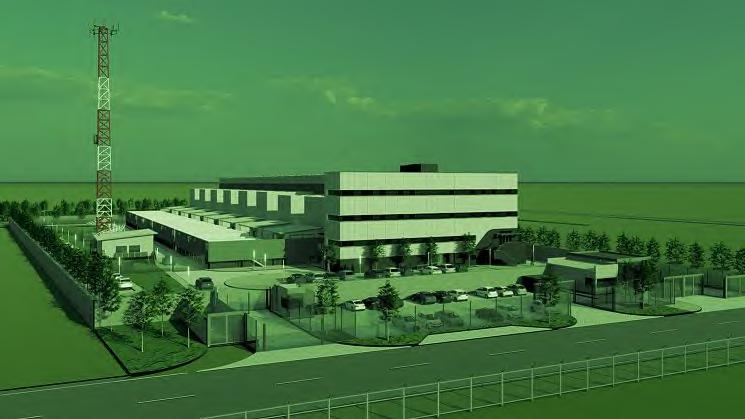

Digitaltechnologiespromisedramatic improvementsinhowpeople live,work, play and communicate. This is particularly truein sub-SaharanAfricawheredigitisationcan improveaccesstolife-enhancingservicesforindividuals,communities and enterprisesotherwise excludedthrough lackofinfrastructure,skillsand funding.Key regionaltrends,includinggrowing digitaladoptionbybusinessand oneoftheworld’s mostyouthfuldemographics,indicategrowingdemandfornext-generationconnectivity. According toindustrybodytheGSMA,2025willseecommercial5Gserviceavailabilityinatleast sevenAfrican markets,including Kenya,NigeriaandSouthAfrica, totalling28millionconnections.
Withdigitaladoptionbybusinesses growing and theGSMAreportingalmost50%ofthepopulation
subscribingtomobileservices, it isthephysical communicationsinfrastructure that restrictsfurtherprogress. Islandsofstrongconnectivityfocus onlargeurban areas,withnetworkdeploymentto smallerlocationslimitedbythecapitalinvestment requiredand unpredictablereturns
OADCisdramaticallyimprovingthissituation,deployingDCsthroughout acountry,right-sizingeach tolocaldemand(fromhyperscale,through“midi” toedge).Thisuniquecore-to-edgearchitecture enables:
• fixedandmobileoperatorstocost-effectively extendnetwork reach
• thecloudcommunitytomigrate contentcloser to thenetworkedge
• disasterrecoveryprovision,andprocessingof largedatasetsclosetothepoint oforigin
• deploymentofnewrevenue-generating,latency-sensitiveapplications
• cost-optimisationofnetworkbackhaulconnections
InSouthAfrica,over20OADCEDGEDCsdelivercontent atthepointofuse,andacorefacilityislivein Durban.Byyear-end,fourmid-rangeDCswillbeoperationalinCapeTownandJohannesburg. OADC’s flagshipDCinLagos,Nigeriais acorefacilitydesignedtodelivertensofMegawattsofcritical power load. From2023, OADC’s core-to-edgearchitecture willbe extendedthroughoutthecountry,theninto furthercountriesacrosssub-SaharanAfrica
Africaisclearly readyforthis levelofhigh-quality, carrier-neutraldigitalinfrastructure.Access to a readily-available, open-access infrastructuredelivering highlevelsofconnectivityand underpinning localinterconnectecosystemsis critical tosuccessfuldeployment andadoptionof5G,IoTandother advancesenabling regionalgrowththroughoutthe 2020s www.openaccessdc.net

Lastyear, theeconomiceffectsoftheCovid-19 pandemicweighedheavilyonAfricanbanks,with a 14.7%dropinnetbankingassetsamongthebanksin our Top 200Ranking.Theyweatheredthestorm, clockingup a recordhighinassetsin2021.Meanwhile, oursecondyearofthe Top 100Insurersrankingsshows pressuresonthesectorwithopenings forgrowth

Aftertheturbulencecaused by the Covid-19crisis, 2021 was a relativelycalm year for the financial sector, inwhich banks were able toclaw back earnings lostduringthepandemic. Compared with2020 figures, thetotalassetsofthe Top 200 increased by 11.01%to$2,192.57bn –a record high Reboundingfrom a 14.7% drop, net bankingincome (NBI) for our Top 200Banks rose by 16.59%in2021 tohit $83.25bn,which was closeto2019 levels of $83.72bn
Thesamenames appearinthe Top 10once again. Standard Bank Group(#1) remainsour top bank for thethird yearin a row, followed by the NationalBank ofEgypt(#2), which could suffer in2022fromthe devaluationof
theEgyptianpound. With BanqueMisr (#6), Egypt places two championsinthis Top 10, as does Morocco – Attijariwafa (#9) and Banque Centrale Populaire (#10)
The12SouthAfricanholdingcompanies inthe Top200account for31%ofthetotal assetsthis year,whilethe23banksinEgypt represent nearly 19%. Thenine Moroccan banks represent 9.4%,andthe18Nigerian banking groups 8.6%
WestAfricaaccounts for more than15.6% of thetotalassetsofthe Top 200, with61institutions ranked. As for CentralAfrica, a region still dominated by Gabon’s BFGIBank(#56) group, itseight ranked banks representonly a verymodest 1.09%ofthetotalassets.
Sanlam is adiversifiedpan-Africanfinancialservices grouplistedontheJohannesburg,NamibianandA2X stock exchanges.Inaddition,theGroup’ssubsidiaries inMorocco and Kenyaare listedontheCasablanca StockExchangeandNairobiSecuritiesExchange, re spectively

TheGroupisoperating over200businessesin40 countries. Sanlam has apresencein 31 countries in Africaas well asselectedpresenceinotheremergingmarketssuch as Lebanon,India,Malaysiaas wellasdevelopedmarkets suchasIreland,UK,USAand Australia.

Establishedin1918as alifeinsurancecompany, Sanlam has evolvedintothelargestnon-bankingfinancialservicesgroupin Africathroughitsdiversification strategy.
Throughitsbusinessclusters,thebusinessprovidescomprehensiveand bespokefinancialsolutions to institutional, corporateand retailcustomers acrossallmarketsegments.

TheSanlamEmergingMarkets cluster, is responsible fortheGroup’sfinancial businessservicesoutsideofSouth Africaandthroughitsunrivalled footprint onthe continent,Sanlam ofers abroad rangeoffinancial expertiseand productsthatinclude,LifeInsurance, GeneralInsurance,RetailCredit,Health, Bancassurance, AssetManagementandSpecialistGeneralInsuranceproducts.

Ifsometemporary easinggrante d to Africanbanks duringthepandemic (inMorocco inparticular) has beenabandoned,themonetarypolicies conducted viathe leverage of key rates by mostAfricancentralbanks continued in2021, supporting economic recovery. The low interest ratestrategy was maintained last year in almostallthemajor economies.
Beyondemergency programmes in2020and 2021, theIMF, the World Bankandnumerous other developmentfinanceinstitutionshave multiplied targetedsupportschemesviathe banking sector For example, inMay 2021, the International Finance Corporation,the World Bank’s private-sectorsubsidiary, granted the firstcertified green loaninAfricato Absa Bank(#7) inSouthAfrica for$150m,anda $50mgreen economy facilityinSeptember 2021totheMoroccanbanks CIH(#38) and BMCEBankofAfrica(#12).
Regionalchampionsfillthevacuum
InApril2021, Standard Chartered announced the sal eorc lo su re offive subsidiari es (Angola,Gambia,Sierra Leone,Zimbabwe andCameroon),andBarclays sold its remainingstakeinSouthAfrica’s Absa(7.4% ofthecapital for €620m)atthebeginning ofSeptember.
Inthe French-speaking world,several playershave takenadvantageofBNP Paribas’s gradualwithdrawalfromthecontinent In NorthAfrica,thesale announced inSeptember 2021 by the Crédit Agricole SA groupofits 78.7% owned ex-subsidiary CréditduMaroc (#59) wenttotheMoroccan groupHolmarcom (Bensalah family) inApril.In Tunisia,the Cartegroupfinalise d theacquisitionof 39%of UBCI(#171) fromBNP Paribasin March2021.
Some internationaland regionalbanks could makea play for Ethiopia.InMarch this year,thecountrysetupaliberalisation committee foritsfinancialservicessector, totake steps to allow foreign banks toinvest inthecountry ’s bankingsector.Depending onwhen Ethiopiaopensthefloodgates, we may see this playoutinour rankingnext year.
While internationalplayersappeartobe exitingthecontinent, someAfricanbanks are transitioning formnationalplayersto regional champions In August2021, Kenya’s KCB Group(#41) acquired theDRC’s Trust MerchantBank(#167) andtook over the
Banque Populaire de Rwanda fromtheMauritian financier Atlas Mara.Itsongoingacquisition ofBancABCin Tanzaniafurtherillustrates the Kenyanplayer’s regionalambitions.
The racebetween Kenya’s largestbanks – EquityGroup(#37) and KCB–mayplay outonthe international stage asEquity Bank, whichmade inroads into the DRC back in2019 andhas a substantial presence in Uganda, Rwanda, Tanzania and SouthSudan,continues to look foracquisitiontargetsinthe region.
InEgypt, where thebanks withpublic capital (NationalBankofEgypt, Misr, Banquedu Caire andothers)have borne thebrunt
On December 2,2021,Rawbankhas receivedapprovalfrom the Insurance Regulationand Control Authority(ARCA) to distribute lifeand non-lifeinsuranceproducts in the Democratic Republicof Congo (DRC). Rawbankis committed to promoting financial inclusion and extendingaccess to financial products. It is the first bankin the Democratic RepublicofCongo to offer its customerssubscription to lifeand non-lifeinsurance offers.

Rawbankwas already apioneerinoffering life insuranceproducts to its customersthrough its Privilege Banking“packages”(aset of tailored bundledoffersdeveloped by the Bankthroughout the year,allowing access to variousbankingproducts in asingle subscription).From nowon, travel,automobile,home, and EducationAnnuityinsurance offers willbe individuallyaccessible to all customers inallof Rawbank’s branches in Kinshasa.Customers will still beable to choose otherlife insurancepoliciesbeyondthose offered in the packages.
Whilethe insurancesector is struggling to develop in the DRC,Rawbank continues to diversify its activities. It is even expandingitsoffer bybecominganintermediaryin the distributionof insuranceproducts,thanks to its partnership with Rawsur, amajor Congoleseinsurancecompany.This approach isinline with the bank’spositioning,which is to work in favor of truly structuring the financialmarket in the DRC.Rawbank believes that whileitis important for people to beable to invest and save, itis imperative to give themthe opportunity to protectthemselves from the vagaries of everyday life.
For Rawbank, this year isindeed marked by the officiallaunching of this new bancassurance offer.Today, the bankhasabout fifteen accreditedsalesrepresentatives, all entirelydedicated tothe sale of automobile, travel, andlife insurance. The firstresultsarepositive. This encourages the bank to go beyond the pilot phaselaunchedlastMarch, and fully integrate this offer throughout its entirebranchnetwork inDRC.
of thethe economic downturn,the governmenthas indicated itsintentionto resume privatisation inthefinancial sector Already, theprivatefinancialgroup EFGHermes (#61), whichentersour ranking this year, was able to take controlofArabInvestmentBank, owned by theEgyptiansovereignfund, inMay 2021.
Sincethen,EFGHermes hasbeenthesubject of a takeover project by theEmirati FirstAbu DhabiBank, which was quicklyabandoned in April 2022dueto ‘macroeconomic volatility’, accordingtothe bank.
As the war inUkraine rages on,andinterest rates see nosignofabating, there isnoguarantee that thepatterns we saw emerge in2021 andthebeginningof2022willcontinueinto next year, makingany predictions a tricky bet. Butcomparingnext year’s resultswith this year’s will make for interesting reading.
Wesentoutdetailedquestionnairestomorethan2,100 financialinstitutionsacrossthecontinent.Theirreplies wereusedtocreateasystematicrankingofAfrica’stop banksbasedontotalassetsize.Ourlistfeaturesonlythe top200banks&100insurers.Alldataiscommunicatedto usbythebanksortheirparentcompanies.Thesefigures relatetothe2021financialyear.Wherethatinformation wasunavailableweused2020figures,indicatedinthe rankingsbyitalics.Banksareremovedfromthelistifthey donotsupplydataduringtwoconsecutiveyears.Thedata wasconvertedtoUS$usingtheexchangeratesapplicable on31December2021.Numbersinthe‘Rank2021’column refertoabank’spositioninTheAfricaReport’s Top200 BanksrankingofOctober2021.
Afr ic a’sg ove rn me nt sn eed ta xr ev enue to fu nd ever yt hi ng from ed uc at io na nd soci al we lf areto paying internationaldebts.Nowonder governments areeyeingdigital financialservices (DFS)–arapidly growing, highly prof itableindustr y–for additional revenue
However, criticshave warnedofthe potential for such ta xes to bear heavilyonlower-income people. So,how cangover nmentscollect much-needed revenuef romthe boomingDFS sector,whileavoiding curtailing itsgrowthand innovation and unfairly burdeningthe poor?
Governmentscan collect ta xesf romtheDFSindustr yintwo ways :
• Many currently ear ne xc iset axes on DFSand corp orate ta xe sf romp rovider companie s. So me ex pe rt s, such as for merKenyan Cent ralB ankg overn or Njuguna Ndun g’u, arguethese ta xesare toohigh. Whileitistoo earlytos ay conclusively what impact these arehavingonmobilemoney market grow th,suchtaxes in major marketshave notpreventedSafaricom from becoming East Af rica’s highest-valued company.
• Severalgover nments have also introduced direct ta xeson DFSpay ments. Ghana’se-lev yisthe latest.Unsurprisingly, thishasprovedunpopul ar,asinUganda andCôted ’Ivoire, result in ginaninitial slump,t henp ar tial re covery,inDFS usage. Longer-ter meffects remaintobeseen.
Theright policy mix depends on contex t, with digitalpioneers suchas Kenyafacing differentchoices. Butthere aretwo cautionar ymessagesgovernmentsshould heed:
• Carefullyconsiderthe impactoftransactiontaxes on peopleonl ow in come s. Newresearch eviden ce from Gh an a sugges ts thee-lev ytobehighly regres sive,with informal sector users in thebot tomquintilepayingthe largestshare as aproport ionoft heirincome.T hi sadd stot healready highly regres sive transaction fees (often 3% or more)and interes t(some times 10 0% or more ann ually) charge dby providers.
DrPhilip Mader DIGITAXResearch Programme Lead

• Exercisec autionin using DFSd at atoe xpandthe ta xnet. Government sare increa singlye xp loring DFSa sa wayto “broaden therevenue base by reducing ta xavoidance and evasion”, as theWorld Bank ’s David Malpass recently put it .But theimp lication that DFSd at ac ould be used to ta x theinfor maleconomy more heavilyrisks adispropor tionate impact on thepoorest,for whom theinfor mal sector exists firstfor survival,not primarilyfor ta xavoidance.
Afairandef ficientt ax sys tem shouldburdenthe broadest shouldersmos t. Citizensquiter ightlye xpectthatmultinational corporations, includingDFS operators,shouldpay ta x in themarkets fromwhich they generate revenue.
Nobody benefits from ta xing DFSout of exis tence.Inf act , DFShasthepotential to make ta xpaymentseasier,thusbenefittingbothtaxpayers andgovernments.However, under-ta xingDFS wouldbeforgoingrevenue fromwhichall canbenefit
Taxingdigitalpaymentsout of existence wouldhelpnoone.But under-taxingmeans forgoing much-needed revenue forpublic goodsthatcanbenefit everyone.


‘SMEst ypically lacktraining andeducationon thelegal andaccountingtools’
‘W henthe goinggetstough ,justrememberwhy youset up inthe first place’

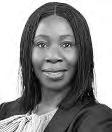
The CEOofEquityGroup talksto TheAfricaReport about theKenyanbank’sregionalexpansionandfindingAfrican solutionstoAfricanchallenges
By PATRICKDUPOUXKen ya’s Equit yG ro up (#37) hasbeenbusy.Sincebuying twobanks inthe Democratic RepublicofCongo(DRC)ina processthatended in2020,it has leda flurryofcross-border activity to buildAfricane conomicintegration.GroupCEO JamesMwangihasbeenbringingglobalasset manage rsandt ec hc ompa nies to Af r ic a, and ferrying Kenyans toUgandaandthe DR C, in ab id to matchmakebetween clientsacrossthe geographies inwhich itoperates.
Mwangialsohopes tobringin$6bn in lo ng -t er mc apital fo rw hathecalls a “MarshallPlan fo r smallandmediumsized enterprise s” Canhesucceed?A yearago, hemanaged toconvince16 developmentbankstosign up,alongside ahostoftopglobalcorporates. Mwangispokeabouthis Recoveryand Resilience planandEquityGroup’s expansion attheAfricaCEO ForuminAbidjaninJuly, to PatrickDupouxof Boston ConsultingGroup
PATRICK DUPOUX:Howdid you managetoconvince developmentbanks to signup to yourplan?
JAMESMWANGI: We have a25-yearshistory withthe developmentbanks, andhave proven ourselvesrepeatedly.So, essentially, when we sat downwiththem, we [hadalready]sat downwith agovernmentandasked:‘What wouldbethepriorities?’Then we stepinas acatalyst. And we lendour nameandour brandtosay, here is a commonplan,can we allhave ourheartson thesame deckandsee howfar we cangoifwe arealigned?
Bybringing everybodytogether,wewere abletonarrow down thepriorities.Andthat iswhyI’m excited that thepriorities have been decided. We will focus onagricultureand the extractiveindustryto increaseproductivity.
We’llthentakethatproductivityanduseit tobuildthemanufacturingsector,whether youcallitindustrialisationor valueaddition.
Tellusabout your matchmakingamong yourclientlists.
‘Nocivilisationhas ever transformed anothercivilisation’
‘WE’LLFOCUSON AGRICULTUREAND THE EXTRACTIVE INDUSTRY, THEN USETHATTOBUILD MANUFACTURING’
Thereare twoobjectives there. Thefirstis toenhancethecreationof ‘oneAfrica,one people’,becausethatiswhen we willhavea single marketof 1.4billionpeople. The second isto leverage oncross-bordertrade.Ifit’sone peopleoroneAfrica,thentradeshouldbethe mostimportantthing Sothenext t hin gi st om atchmake. In December,wetook300 KenyanstoDRC. Three monthslater, they hadcomeupwith dealpipelinesfor$2bnofinvestment,which we have processe dquickly. TheB elgians saidtheywouldalsoliketobetakentoDRC –wetook120ofthemtoDRCand Rwanda. And we arestillconsideringthe investment opportunities thattheyhaveproposed. Then we tookSouth Africans toKenya. And,last week,wetookUgandansto DRC. Soit’sbringingpeopletothe realitythatthere kl dh bd

is a market already just across the border. People’s perceptions have been shaped by media analysis; the reality might be very different. And, more importantly, it is to create people-to -people relationships before you talk about trade.
L astly [it] is to activate the East African Community [EAC] trade protocols, the common market and the African Continental Free Trade Area
You are now the largest bank in the DRC. Why the big bet?
The situation the world is in today gives DRC a very unique opportunity to plug in and play, and hopefully create a lot of energy in Africa. Let’s look at arable land: DRC has 8m hectares of agricultural land that has not been utilised So, essentially, the shortage we are talking about that is causing food inflation around the world can be solved by one country: DRC.
The second aspect is power DRC can le ad the whole of Africa with hydroelectricity, but, more importantly, let’s talk about electric cars and the climate- change scenario If DRC produce s 60% of the cobalt, that is go -
ingtothebatterymanufacturers.So youcan seethe components it canbring DRCisthesizeofasubcontinent.Ithas100 millionpeople. So evenattheniche,sovereign level,ithas asignificantconsumingpopulation. Thisisabigbet,[but] we tookDRCincontext ofitjoining theEAC, soitisnotDRCstanding alone.It’sDRC becomingpartofa300-million populationmarketwithintheEAC, andthe desireofDRC itselftotransform.
What do yousay tothosewhoclaimsmall companiesandtheunbanked arenot a greattargetfor abank?
Fromitsinception,Equity’spurposehas been tochangelives,togivedignityandto expand opportunities.AndsoallthatEquity has done istoscale[thatup] overthepast40 years.We have proventhatpurposeisprofitable. Thirty we were 66thoutof66inKenya.We Kenya’s largestbankandthelargest asternand CentralAfrica. erintroducedourselves asbeing in mediationspace.Thisis amovement conomictransformation;movements mbers,and that’show theconceptof emberscamethrough.
years ago, are now bank in E We neve the inter of socio-e have me Equity me
You are p Africa’s p Africa’s p COP27 cl necessary Africa se ctor is compani the face o We are o Africa. S African na provide th solutions the one wh we under and then to appre transfor We, as civilisatio private se […] abov across th together, along wit
art ofthenewcoalitionof privatesectorthatwillarticulate positiononclimatejusticeat the limate conference. Whywasit y tocreatethiscoalition? needstotellitsstory.Theprivate comingofage. Theseare global esoperatinginAfrica. We need tobe f AfricaandtellthepainsofAfrica. peratinginAfrica. We understand o thereisnobetterpersontotellthe arrative. The second reasonis: let’s heleadership everytimeonAfrican ifit’sanAfricanchallenge. Let’sbe hoisdefining theproblembecause standit.Let’salso definethesolution rallyothersto come.Wehavecome ciatethatnocivilisationhas ever med anothercivilisation.
a generation,must leadtheAfrican ontofindits ownsolutions.Andthe ector,ifyou lookatthecompanies e $1bninrevenue,theyare spread e Africancontinent.And, coming theycanshoutthecauseofAfrica h our governmentsandourpeople.
TheCEOoftheAfricaregionatSouthAfrica’s StandardBank talksto TheAfricaReport abouttrade,themacroeconomy andtheimpactofgeopoliticaltensionsonAfricangrowth
By DAVIDWHITEHOUSEAfricancountries mustimport from eachother “ratherthan re lyin g onEurope”, Yi nk a Sanni,CEOofAfrica regions at Standard BankGroup(#1) told The Africa Report inJuly. Speakingfrom Lagos, hesaid the warbetweenRussiaand Ukraine heightens the urgency ofimplementingtheAfrican Continental Free Trade Area (AfCFTA). Africancountries need to “pump upproductioncapacitywhere they have comparative advantage”
Research by the United NationsDevelopment Programme(UNDP) inMay said thattheimpact ofthe Russia-Ukraine war could pushAfrica into ‘serious debtdistress’.UNDP regionaldirector forAfrica
Ahunna Eziakonwa says thattheeffects oftheconflicthave dera iled a tentative post- Covid African re cove ry. Foodand fuelprices have risen,trade in goods and services hasbeendisrupted,fiscal leeway hasbeencutandgreentransitionsslowed
For Sanni,the war inUkrainehasshown the extent towhichAfricaisintegrated in
theglobal economy. Henotesa “dramatic increaseintheneed for financing” among Africancorporates and governmentsascurrencies have been devalued andinflation has climbed.That creates opportunities as well asproblems, Sanniargues. Hesees Africa’s glass as“halffull rather than halfempty ”.
InNigeria, Dangote’s oil refinery, oncecompleted,should allow the exportof refined products, while thegroup’s fertiliser plant alsoneeds to exporttothe WestAfrica region,Sannisays. SouthAfricahas a similar advantage inautomotive manufacturing, while Ethiopiacanincreasewheatsupply, headds Sanni wantstoincrease Standard Bank’s investmentsinNigeria.The bank owns67.5% of Stanbic IBTC andplans tomake useofits regulatoryauthorisation to raisethat to 70%, hesays.
Ther e ma y also bemore inve stment in Kenya,where the bankhas“long-term confidence” inthemarket.Ethiopiais a market that “excites” Standard Bankinthe long view Licensingof foreignfinancial-services
‘African countries should pump up production capacity now’
The Africa regions business increased revenue by 26% in the past half year
providerswillstartatsomepoint,Sannisays
Whenthathappens,subjecttothe details,the bankmayupgradefromitscurrent representativeofficetohavingan Ethiopiansubsidiary.
ThecontributionoftherestofAfricatothe group’sheadlineearnings, whichcurrently standsat35%, “shouldcontinuetogrow ”, Sannicontinues.Thebank’s first-halfheadline earnings for2022increasedby33%to arecord R15.3bn($870m),andtheinterimdividend wasraisedby43%.
TheAfrica regionsbusiness, whichcontributed37%togroupheadline earnings,increased revenue by 26%,driven by higherinterest rates, increasedtransactional volumes, arecovery ininternationaltradeas lockdowns eased, and double-digitgrowthintrading revenue

Thetop six contributorstoheadline earnings outside SouthAfricawereAngola,Ghana, Kenya,Mozambique,NigeriaandUganda.
With apresencein20countries on the continent,StandardBank’s distributionstrategy willcontinueto relyon amixtureofdigital channels, bank branches andpartnerships, Sannisays.Discussionswith fintechsonnew partnershipstohelpwith“lastmile” distributionareongoing,hesays. Insomemarkets, 90%oftransactionsarenow beingcarried out by digitalmeans.Butthe decisiontoopen a
branchnearthe Dangote refineryshows that branchesstill have apartto play, headds
Thebank’sexposuretosub-SaharanAfrica poses‘someassetqualityrisks, giventhe challengingandmorevolatile natureofthose jurisdictions’compared withSouthAfrica, accordingto acreditopinionfromMoody’s Therisksare mitigatedbythebank’s ‘disciplined approachandconservative selectionof sectorsand clients’, Moody’s adds Onedanger forthebankisthepossibilitythat SouthAfricawillbeincluded ontheFinancial Action Task Force’s(FATF’s)‘grey list’,after an FATF review foundgapsinSouthAfrica’s anti-moneylaunderingandcounter-terrorism financingframework.Authorities have until Octobertofixtheproblems,orriskincreased FATFmonitoring
AccordingtoS&P Global, such amove would mean reputationalriskandpotentiallyhigher compliancecosts forSouthAfricanbanks. Still,S&Psays,SouthAfricahas deepcapital markets,andliquidityfromnon-bankfinancial institutionspluscentralbankintervention wouldlimitthe chancesofa‘risk-off’reaction.
Aprojectthathas drawn controversyisthe planned EastAfricanCrudeOilPipeline (EACOP)betweenUgandaand Tanzania.Oil fromUgandawillbetransportedtothe portof Tangain Tanzaniaviathepipeline,inwhich TotalEnergies has a62%stake. Constructionis planned tostartin2023inthe faceofopposition fromUgandancivil-societyorganisations.The Dutchcampaigning organisationBankTrack says that,atpeakproduction,carbonemissions ofoiltransportedthroughthepipelinewill exceed thecurrentemissionsfromUganda and Tanzaniacombined.
Moody’s notesthatthebankis facingmountingbusinessrisksandstakeholderpressure tomeetcarbontransition goals.Standard Banksays it iscommittedtonet-zero carbon emissionsfromits ownoperations by 2040, andfromitsportfoliooffinancedprojects by 2050. Butitis leavingitsoptions openon financingEACOP, whichmanyglobalbanks andinsurershave refusedtoback.Thebank iscontinuingto review anindependentreport intotheenvironmental andsocialimpactsof thepipeline,Sannisays.“We have beenassured by TotalEnergies thatthey willbe compliant with equitable issues.”
Inflationishurtingprospectsfor Africaninsurance penetration,butsomemarketsarestillforecasttoshow double-digitgrowth
By DAVIDWHITEHOUSEAfrican l ife insu ra ncemarke tsstilloffer “p ocketsof opportunity” evenasinflation andslowinggrowthcloudthe continent’s overall prospects, AbsaLife Insur a nce C EO EugeneStrausstells The Africa Report Kenya,Mozambique and Botswanaare marketswhere AbsaLife has the chancetoachieve “low double-digit” growth,driven by increase d penetrationas wellashigherpremiums, Strausssays from Johannesburg. The company is focusingon
inve stingtoincreaseitspresenceinthese markets, hesays
Corporategroupschemes for employe es are the “dominant” factorinthepocketsof growth,Strausssays Theschemes typicallyinclude anelementoflife cover thatthe employee may need toadd to by purchasing furtherprotection. Prospectsin Kenya are alsohelpe d by the factthatmany people are alreadyuse d toinsuringtheirchildren’s education,while increase d accesstoproductsinMozambiqueishelpingtoimprove penetrationthere, headds
Absauses its corporateand investmentbanking relationships toencourage companies toprovide suchplans – andtoincreasecontributions, Strausssays Employee contributions currentlyne ed toriseto reflect the factthat there isstill a riskof excessmortalitydue to Covid-19, Strauss says “It’sa bighurdle.”
Thepandemic hasmade life cover “more re al”toconsumers, thoughinflationand pressure onhousehold incomes is a current headwind,hesays. SouthAfrica,where AbsaLife does mostofitsbusiness(five millionpolicyholders), and Zambiawillsee slower, single-digitgrowthduetopressure onconsumers, headds
AccordingtotheconsultantsatMcKinsey, levelsofinsurancepenetrationinAfrica are halfthe world average as a percentage ofGDP, andper-head premiumsare 11 times lower thanthe restof the world. More than 90%ofAfrica’s insurancepremiumsare concentrate d injust 10countries, the largest ofwhich – South Africa – accounts for 70% Thebulk of the grow thinAfricais likelytocomefrom pensionsandindividuallife insurance, McKinsey says.
The lo ng-t ermgrow thprospects lo ok favo urabl e. McKinsey says thatAfrica’s working-age populationwill exce ed those ofChinaandIndia by 2034 Analystsat ResearchandMarketshaveforecastthatthe continent’s insurancemarketwillgrow at a compoundannual rateof 7.5%tobe worth $115.9bnin2027. Insurersare positioning themselves tograb a share ofthegrowth.
Sanlam(#1) and Allianz this yearagreed a joint venture thataimstoincreaselife and generalinsurancepenetrationin29African countries. Prudential,whichin2021took a strategic de cision to focus on Asian and Africanmarkets, isconside rin g entering new Africancountries, while globalinsurancebroker Willis Towers Watsonsays it
may conclude distributionpartnerships in WestAfrica.
Somearguethatprice pressures from higher reinsurance price s will prove a stumbling block Insurancecompanies use reinsurance – insuranceoninsurance – toprotectagainst risks ofmajorclaims
Theperiodfrom2010to2018 was oneof “soft”global reinsurance prices, wheninsurancepenetrationinAfrica failed toincrease, says RyanPhillips, chiefoperatingofficer atAfro-AsianInsuranceServices, a Lloyd’s brokerin London.In recent years, theglobal markethashardene d acrossallspecialist line s, meaningthattheAfricaninsurance marketisnow “themostdisconnecte d that ithas ever beenfrom reinsurance”.
Thepriceincreases have been espe cially marked in aviation,casualty, politicalviole nceandterro rism cover, hesays While re insurersare ke en todiversifyintonew areas such asAfrica durin g softpricing periods, the reverse istru e whenprice s harden,headds.
Mostofthe losses that led tothehigher reinsurance rates were notincurred inAfrica, yet thecontinent, as a re lativelyunderinsu re d area , bears thebrunt oftheimpactofhighercosts.
“A ffordability has beenhard tochange,” Phillipssays. “Noonehasbeenable tomake itaffordable for thepoor.” Hepointsto a lack oftrustininsurers, as wellascontractsthat are hard tounderstand,aspartoftheproblem.Phillipssays ittookhimtwo hoursof studytounderstand his own Covid-19policy!
Phillipssays he se es somegrounds for optimism that mobile technologywillhelpto createinsurancescale astheAfricanmiddle classes grow. Butthere isstill a ne ed to get over thetrusthurdle, hesays. Evenwiththe righttechnology, many stillseem reluctant to handmoney over toanunknowncorporate entity, hesays
the trust hurdle in Africa could give african insurance companies an advantage over multinationals
That makes it more likely that African ratherthanmultinationalcompanies will achieve success, heargues. “Governments and regulatorshave to do more tosellthe benefitsofinsu ra nce,” hesays “It’s not hittinghome.”
Researchfromthe Swiss Re Institutepredictsthatglobalinflationwill remainhigherthaninthe2010s throughout thecurrent decade. The impact on insurance-claimcosts, the researchsays, will be lessinlife policies compared with nonlife, aslife-insurance benefits are defined at theoutset.
A survey ofinsurance executives in Africa by EY foundthatincreased earnings by householdsandbusinesses are the leadingdriverofgrowthinpremiums. AbsaLife Insurance’s Strauss agrees thatthe economy andthe reinsurance cycle willmake itdifficult todrive up penetration inthecontinentas a whole. Butmarkets are diverseand itis“verydifficulttodraw conclusions at an African level”, hesays. Cultural resistanceto discussing deathmeansthatinsurance salespeople should nottake a hard-sellapproach.
The key criteria,Strausssays, are “flexibility, accessandpricingpoint”. Theuseof
digitalproductsand distributionchannels is “non-negotiable”, and allowingpremium “holidays” attimes of economic stress makes policies easiertosell.
Eddie Ford Brown,theheadoffrancophoneAfricaat Prudential,says he “doesn’t entirelyagree” withallofPhillips’s analys is. Pr udential,whichin2021tookthe strategi c de cision toconcentrateon gr ow thmarketsin AsiaandAfrica,has thescale thatallows some reinsuranceto besupplied internally, Brown told The Africa Report fromAbidjan. Thecompany isbig enoug h thatit do es have some ba rg ainingpower when using external reinsurance, headds.
PrudentialAfricahas 11,000agents and a bancassurance ( whe re aninsu re r sells products throughbanks) networkofmore than600bankbranches initseightAfrican countries. Brow n isconfide ntongrow th prospectsinAfrica,includingin Côted’Ivoire, where Prudentialhasopene d three new agencies this ye ar.
“We’re ontheground, we understandthe customersandtherisks,” heconcludes. Foranalysisofthe performanceofthe Top100 Insurers, please visittheafricareport.com
the impact of high global inflation will be felt more by non-life than life policies
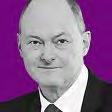

‘T hings eventually dorecover andmarkets come backit’s just aquestionoftime’
PAUL HANRATTY Sanlam CEO(#1)SANLAM


‘Investment in education and skillsdevelopment arecentral to theworkwearedoing’ EDITHJIYA

Howmuchdoesinternationalconnectivityinfluenceeconomicand socialdevelopment? Accordingto a study by CentroStudiTIM,broadbandcontributedaboutUSD1.1 trilliontoAfrica'sGDPgrowth in thedecadeendingin2019,while future investmentsininternational capacityandconnectivitycould bringfurtherbenefitstoAfrica's GDPper capita,estimatedfrom 0.42%to0.58%injustthefirst2-3 yearsfollowingtheimplementation of newinfrastructure.
Globalserviceprovidersplayan important roleasthey supplyfast internationalconnections withhigh reliabilityandsecuritybetween the corporateand residentialinfra-
structuresandmajorcloudprovidersoperatingon ageographic scale,andarethereforeamong the players in theongoingtransformationprocess.
Sparkle,amongthetopglobalserviceprovidersworldwideandthe secondlargestoperatorinAfrica intermsofInternettraffic,provides internationalconnectivityanddigital servicestotheAfricancontinentand particularlyinNorthAfrica,thanks toitsextensivenetworkrunning aroundthecontinent,toitspointsof presence(PoPs)inNigeria,Morocco andDjibouti,andtoitsstrategic SicilyHub,themainexchangepoint forInternettrafficfromAfricatoEurope,theMiddleEastand Asia.
ItsservicesincludeIP,capacity, cloud,datacenter,mobiledata andvoiceandaredeliveredover a proprietar ybackbone of morethan 600,000kmoffiberspanningfrom EuropetoAfrica,the Americasand Asia.ByusingSparkle’sservices, nationaland regional telecommunicationoperatorsandISPscan inturnofferhighspeedinternet access,cloud, roamingandmany otherinternationaltelecommunicationservicesto theirend-users.

Through apartnershipwithSparkle,multinationalcompanies can undertakedigitaltransformation in aprogressiveandtargetedmanner,through360°supportonall aspectsinvolved -network,cloud, security andmanagement.Infact, Sparkle'sdigitalservices range fromsecureconnectivitysolutions -connecting,forexample,a com-

pany'sofficesdistributedin variouspartsof theworld-toCloud andMulticloud,tosteercompanies intheirdigitalizationjourney,and IoTtocontroltheir assets
Aconstantlyevolvingnetwork,as the operator haspartneredwith Google andothersonthe constructionof theBlueand Raman submarine cablesystem,anew intercontinentalinfrastructure stretchingfromItalytoIndiawith branchesintheMediterraneanand Redseasamongthe route,aimed atimprovingcommunicationsbetweenAfrica,Europe,the Middle East andSouthAsia
Byprovidinginfrastructures,advancedconnectivityanddigital services,Sparklecontributes to thedigitaltransformationofthe continent

Flutterwave’s state-of-the-art officesinLagos
2021broughtswiftgrowth,record-breaking fundraisingandvaluationsinthebillions forAfricantechstartups.Withinvestors startingtopullbackthisyear, isthiscause forconcernor a signofmaturity?
By KANIKASAIGALBy theend of 2021, things were lookingfrothy onAfrica’s tech startupscene Thenumberof deals closed hadmushroomed to 681, by 640 startups, in the courseof the year, according to a report by Partech Partners. Intotal,they broughtinaround$5.2bn – nearly three times theamount raised in theprevious year, and growingsix times faster thantheglobal average. Fourteen ofthem were “mega deals” of over $100m,making up 48%ofthetotal value raised.

Funding rounds were also closingin record time. “Iheard thatsome deals weregetting donein a number ofdays,” says AdesojiSolanke, directorof frontier banks and fintechat RenaissanceCapital.“Many of them were oversubscribed.”
Valuations were sky-high.In February2021, payments firm Flutterwave closed $250min SeriesD funding, pushingits valuationtomore than$3bn.In August, mobile-money service OPay raised $400minSeriesC funding, witha valuationat$2bn. Then, in September, mobile-money platform Wave raised $200m in SeriesA fundingwith a valuation of$1.7bn.
“We’ve seenrising valuationsand multiples oftransactionsatall rounds, evenbefore businesses prove theirconcept,” says Yomi Jemibewon,managing director of CardinalStoneCapital Advisors,a WestAfrica-focused private- equity fundmanager. “There’s been a bubbledeveloping for sometime, andit’s gettingbigger,” he warns.
Hio Sola-Usidame, the founder of OnePort365,a transportation, storage and logisticscompany that facilitates freight forwarding,
disagrees: “There wasa bubble – no doubtabout it – butthe market isalreadycorrecting itself,” he says InMay 2022,OnePort 365 raised $5minseed funding, witha valuationofthecompany at $30m.
Internationalinvestorscoming inatlater stages offundingsaw Africantechasan attractive bet amid the lower-yield environment that characterised 2021. For thebig players – Greycroft, Tiger Global, SoftBank, VelocityCapitaland others – thismeantwriting relativelysmallcheques justto geta footinthe door Otherssuccumbed tothe‘FOMO’effect – fearof missing out.
“The low costofcapital was one ofthe reasonswhy someofthe more ‘aggressive’ fundsbeganto investinthe region,” says Claudio Alvarez,a partneratGPBullhound in London. “And these were a mixture offunds: somethat knew the region well, thosethat were taking a longer-termapproach, andsomethat were perhaps a little cavalierintheirplans to deploy $100morso per deal Whatstarted tobecome obvious, however, was thatthere wasa high opportunity cost to not participating.”
Momentumcontinued tobuild until theend of last year, when capital flows into Africanstartups hita record high. According to researchersat Partech,the average dealsize atseed stage grew 50%in2021to $1.2m;SeriesA funding rounds grew on average by 90%to $8.8m, andSeriesB fundinggrew by 92% to$24.5m.

“There was more capitalchasing a finite number of deals,” says Jemibewon. “Andbecausesome fund managersjust wanttowrite cheques andAfricanstartups want thecash,thisallmeans that some transactionsthatmay nothave seen thelightofday 18to 24 months ago were now getting done.”
Accordingto researchfrom McKinsey, between 2020 and 2021 the numberoftechstartups inAfricatripled toaround 5,200 companies. Justunderhalfofthese were fintechs. Africa’s fintech industry, says theconsultancy, is ‘comingofage’
As thefintechmarket matures, investments have started to move into logitech,health-tech, ed-tech andothertechnologystartups – allgaininggroundacrossAfrica becauseoftheir transformative impact for development.
But, unlike fintech,which already hasan established framework that a number of newcomers canpiggybackoff, other tech companies may need to build their own complicated systemsor join upcomplex processes tomake their businessesa reality.
Forinstance, logisticscompanies mayneed smartcontainers and reliabledrivers,andhealth companies willneed steadyflows ofmedication,storage facilities andaccessiblepharmacies.Allof
5,200
this requiresadifferentapproach toduediligence forinvestors.
“Theproblemisthatsome investorscategorisealltechstartups like fintechand failtosee themas verydifferentopportunities,” says MichaelMoreland,theCEO and founderof Field Intelligence Inc,a pharmaceuticalsupply- chaintechnologyandservices company based inNigeria.“In general,fintech investments are lower risk. There ismore buzzaround them, and the returns are higher Thismight notbethecase with a newer tech company,” says Moreland.
However, Morelandargues, Africancompanies in generalare held to higherstandardsthan their internationalpeers.
“From my own experience,it’s plaintoseethat, overall,the diligenceisharderandmore demanding,largelybecausethere isstillmuchmorescrutinyand scepticismaround doingbusiness inAfrica,”hesays.“It’sakindof unofficialtax youpay forsetting upabusinessinAfrica.”
While investment intothe African startup scene hasgrown, the industryisstillnascent:according to research by the Tony Blair Institute for GlobalChange, the sectoraccounted for just 0.2%
ofthe value ofglobal startups. Realandperceived risk, such as informationasymmetries, volatile exchange rates, underdeveloped investment vehicles and limited exitoptions, continue tolimit investor participation.
A brighter spotlightisnow being shoneoncorporate governancein Africanstartups InApril,Nigerian investigative journalist David Hundeyinpublisheda damning accountofalleged insider trading, employee stock-optionfraud, company negligence, sexualharassment and workplacebullyingat Flutterwave. Then,inJuly,a Kenyan courtfrozea numberofaccounts held inthecountry by Flutterwave on suspicionof money launderingand otherillegalactivity.
Flutterwave is not theonly company to take a reputational hit. In March2022, TechCabal publisheda storyon the ‘tyrannical’ leadership of Ebun Okubanjo, CEO at BentoAfrica, a digitalpayment platform.Inthesamemonth,the Bank of Ghana ordered mobilemoney wallet Dashtosuspendits operationsduetoits failure to get the required authorisations.
InNigeria,the hashtag
#HorribleBosses tookoffon Twitteras workersouted toxic workplaceculture atseveral startups Themovementbrought tolight justhow lacking corporate governanceisinthesector
“Thesestartupguys are highly educated people, comefromIvy Leagueschools, have allthe right connectionsandknow exactly how to sellthemselves, andthis
makes investorscomfortable” says Hundeyin, the journalist “But the realityistheirbusiness modelsare flawed,orthey are notactually doing what they claimto do This meanstheir valuationsare based on false fundamentals, andinvestors will eventually loseout.”
For AndreataMuforo, a partner at venture capitalfirmTLcom based inNairobi,the takeaway should not be that all companies that have raised fundsin thepast18 months are overvalued orsimply badcompanies. “More than 600 companies raised capital last year The few bad playersare not and should not be representative of the ecosystem – and it isa young ecosystem,” shesays.
Startups looking to raisecapital like their peersdid intheheady days of2021may find thingsa little more difficultnow. As interest rates rise in developed markets, international investorshave beguntopull back fromAfrica andthe developingstartuplandscape
ByAprilthis year,the valueof funds raised by techstartups was down40%compared to justa month earlier. Accordingtodata compiled by RenaissanceCapital, the averageamount raisedinSeries A, BandCfundsbetweenQ42021 andQ12022had fallen29%,23% and26% respectively.
40%
Dropinthevalueoffundsraisedby
“In a world where interest rates are goingup, limited partners [whichprovide fundsto venturecapital firms]now have more attractive optionselsewhere,” says Renaissance Capital’s Solanke. “There isstilldry powderinthe system,but theriskof startupsnot beingable to raisesubsequentfunds increases asinterest rates tick up.”
“Have we peaked? Yes,” says Alvarez atGPBullhound. “Startups acrosstheglobeare not following thesame trajectoryand valuations have comeoffsignificantly.”
A catastrophic implosion of thetechstartupscenein Africa does not looklikelythough.What playersare seeingis a shifttoan environment where startupsneed to workharderto prove theircredentials and valuations
It all pointstomore maturityinthe system. “The environmentis experiencing a shakeup, similar to what we have seeninmore developed marketsin recenthistory,” says Brian Mogeni,co-founderandCEO of Wowzi, a platform designed to help brandsautomate influencer marketing programmes. Wowzi raised $2min a seed roundin mid-December2021 “For founders, it meansthat we have tobelieve in ourcore business and relay thisto venture-capital funds,” hesays
Analysts point out thatthecircumstances for Africanstartupsare different from those that led tothe US dot- combubble inthe1990s. “Thiscontext oughttobe avoided,” says AbiMustapha-Maduakor, CEOatthe Africa Venture Capital Association.“Rather, we should see overvalued startups inAfrica’s venture landscape asan exception andnotthenorm.”
And, as TLcom’s Muforo argues, for companies withstrongfundamentals, there willalways beinterested funds. “Funds are just being muchmore selective,” shesays.
 ByTEMITAYOLAWAL
ByTEMITAYOLAWAL
InApril2022,AirtelAfrica was grantedalicencetooperate as a paymentservicebank(PSB) in Nigeria –nearlyfour yearsafter initialguidelines aroundPSBs were publishedbythe Central BankofNigeria (CBN).Airtel isthesecond-largesttelecom operatorinNigeria by subscribers, accordingtodatafromtheNigerian Communications Commission.
ThePSBlicenceenables mobile networkoperators,mobile-money providersandretailchainsto provide ascaled- down version ofbankingservices. To qualify, amongotherthings, theymusthave aN5bn($12m)capitalbase
The regulatory hurdlesshould beviewed astheCBN“protecting thecountryandsafeguardingits economy”,saysMuyiwaEbitanmi, CEOofAirtelAfrica’s SmartCash mobile-moneysubsidiary.
AlthoughEbitanmipaintsa picture of collaborationand mutual respectbetweenPSBs, traditional banksandthe CBN,the roadhas
notbeensmooth.MostPSBsabide by traditionalbankrules,but some arelobbyingforchangesinregulation. Worriedabout losingmarket share, commercialbankslobbied theCBNandhelpedtodelaythe issuanceoflicences.
Isit possible –orevennecessary –forPSBstocreatetheir owninfrastructure,weaning themofftheir dependanceontraditional banks anddisruptingthe currentorder?
That isnottheaim,Ebitanmi says.“[Wewillcontinueto] collaborate withthe banksto developthefinancialservices industry,help re duce the population ofNigeriansthatarefinancially excluded,andsignificantly developthepaymentsystem.”
Headds:“Webelievethat we allcomplement each other, and hencecollaborationiswhatwill empowertheNigerianpopulace andhelptogrow thee conomy.”
PSBguidelinesissued by the CBNin2018statemobile-money operators arelimitedtoproviding
savings accountsore-wallets, accepting depositsfromindividuals andsmallcompanies,andissuing debitandpre-paidcards.IfPSBs worktobringmore unbanked peopleintothe financialfold, bankscan leverage this forloans andotherservicesthatPSBsdonot offer,Ebitanmi pointsout
Hesays thecurrenttargetfor SmartCashistolaunchservice pointsinruralareas inorderto expand financialinclusion.“We will focusonfinancialliteracy because we seethatasanopportunityto getmorepeopleintothe financialservicesspace,” hesays
“Thedistribution network that we have createsenoughopportunity forustobeabletorun a viablebusinesseitherintherural communities ortheurbancentres. Theinterplayofmoneymovement betweenthesedifferent geographies inthecountrywillcreate abusiness case thatmakes [thePSB] very viable,”hesays.
Ebitanmisays hesees alotof opportunitytocollaborate with fintechs andinternationalmoneytransferoperatorsas well. “The marketisbigenoughandpresents theopportunitytodigitalise payments, minimisecashtransactionsand reducethe costofoffering financialservices,”hesays.
‘T he market is bigenoughto collaborate’The CEOofAirtelAfrica’sSmartCash talksto TheAfrica Report aboutthechallengesandrewardsoflaunching mobile-moneyservicesinNigeria
TheconsortiumofKenya’sSafaricom,Japan’sSumitomo, theUK’s VodacomandtheUK’sCDCGrouparegearing uptocompetewithmonopolyproviderEthio Telecom
By TOMGARDNER inAddisAbabaKenyantelecomsprovider Safaricomlaunched its Ethiopian networkin the north- eastern city ofDire Dawa in August, the first stage of a phased national roll-out that willinclude 24 other sites by April2023

Thestaggered launchwill make Safaricom’s services availableto 25%of Ethiopia’s 110 millionstrongpopulation,according toMatthew Harrison-Harvey, Safaricom Ethiopia’s chief external affairsand regulatory officer.
“We are startinginDire Dawa becausethat’s theclosestplace to being ready, and then we will be openinginothercities, including AddisAbaba,in the next few months,” Harrison-Harvey told reportersinthecapital.Safaricom’s
goalis for itsnetworktocover the entire country.
InMay 2021,a consortium led by Safaricompaid $850m for the first everlicencetooperate private telecomservices in Ethiopia, the world’s lastgreat underserved market. Plans tosell a secondlicence were shelved amid economic uncertainty stemming fromthecountry ’s civilconflict withthe northern Tigray region.
Safaricom’s licenceruns for 15 years, and thecompany is expected tospend$8bn in Ethiopia – the
1.5m
Safaricomhasannounceditsintention tocreateandsustain1.5mjobsfor Ethiopiansoverthenext10years.
country ’s largestsingle foreign direct investment. Ithadbeendue tostart commercialoperations earlierthis year, but faced challenges involvingimportingtechnologyandgainingaccessto land.
“We’vebeenbuildingstrong foundations,” saidHarrisonHarvey.“When we come, we ask for yourpatiencebecausethe serviceswillbenew, but we’re confidentaboutthequality.”
He said Safaricomnow hasmuch of itsinfrastructure inplace, including two datacentres and a customer callcentre, butthecompany will have to share stateoperator Ethio Telecom’s communicationtowers while itbuildsthousands ofits own.
Ethiopiahasoneofthe region’s lowestmobile phone penetration rates, the legacy of a sector dominated by a single state monopoly Safaricom’s entry into themarketis expected to bring downprices, butithasnot yet received permissiontolaunch its mobile-money service, M-Pesa, in Ethiopia, owingto a law that currentlybans foreigncompanies fromofferingtheservice.
Large parts of Ethiopiahave beensubjectto phone and internet shutdownsin recent yearsasthe countrygrapples withconflictand instability. Harrison-Harvey said Safaricom would complywithany government requeststoturnoff parts ofitsnetwork. “It’s a very important issue It’s alsoa very sensitive issue,” hesaid.“If we are asked to do somethinglike that, ourlicenceinvolves obligationsto complywithnational security, like any other countryinthe world.”
